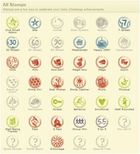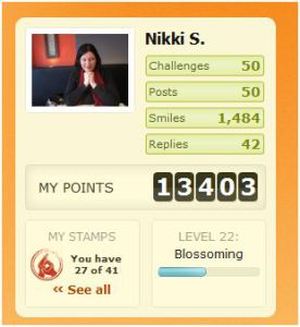In Education & Fitness...
So many students “tune out” at school, or they just go through the motions; doing the bare minimum to get by until they are released into the real world. The question remains, are we adequately preparing them for their roles when they get there? Probably not, though I can say with certainty that a lot of great teachers are trying – my Twitter PLN is testiment to that!
What are the elements of video games that make players sit in front of a screen, focused for hours on end, and how can we transfer them into the classroom?
| Video games: 1) are challenging, but too challenging, 2) incorporate continuous decision-making, 3) provide the ability to take risks, 4) have good pacing, 5) provide immediate feedback, 6) adapt to a “player’s” skill, 7) and, there is a strong narrative. This is summed up in an awesome Prezi by Ryan McCallum http://www.cleanapple.com/?page_id=351, and also here: http://prezi.com/tf-2y_vwvcht/what-teachers-can-learn-from-video-games/ |
Gamification in My Life!
 Achievement Stamps
Achievement Stamps If players do something healthy—such as taking a walk, eating a vegetable-rich salad, or wearing lip balm that provides ample sun protection—they hit a “Done” button and gain points, earn health badges, and progress toward higher levels of the game.
(It’d be easy to cheat in this game since there’s no mechanism to prove that a challenge has been done, but then players would really only be wasting their time and, potentially, misleading their friends.)
I have so far completed 50 challenges, and feel a great sense of accomplishment. Now, I just need a House Cleaning game!
This got me thinking, or reflecting, if you will....
Sounds quite similar to some of the things we already do, doesn’t it? It’s just kind of tying the bits together, and thinking of it and presenting it to the students as a game. A variation could be, “Super Teacher”…
Real-Life Example:
Quest to Learn is a New York City public school, a school that uses “game-like learning” as a way to empower and engage students from all walks of life. Quest to Learn (Q2L) is specific in its focus on connecting rigorous student learning to the demands of the 21st century, supporting young people in their learning across digital networks, peer communities, content, careers, and media.
From the Site’s Overview…
Mission critical at Quest is a translation of the underlying form of games into a powerful pedagogical model for its 6-12th graders. Games work as rule-based learning systems, creating worlds in which players actively participate, use strategic thinking to make choices, solve complex problems, seek content knowledge, receive constant feedback, and consider the point of view of others. As is the case with many of the games played by young people today, Quest is designed to enable students to “take on” the identities and behaviors of explorers, mathematicians, historians, writers, and evolutionary biologists as they work through a dynamic, challenge-based curriculum with content-rich questing to learn at its core.
It’s important to note that Quest is not a school whose curriculum is made up of the play of commercial videogames, but rather a school that uses the underlying design principles of games to create highly immersive, game-like learning experiences. Games and other forms of digital media serve another useful purpose at Quest: they serve to model the complexity and promise of “systems.” Understanding and accounting for this complexity is a fundamental literacy of the 21st century.
The brainchild of Quest To Learn is a professional game designer named Katie Salen. Salen, like many people interested in education, has spent a lot of time thinking about whether there is a way to make learning feel simultaneously more relevant to students and more connected to the world beyond school. And the answer, as she sees it, lies in games.
She believes that going to school can and should be more like playing a game, which is to say it could be made more participatory, more immersive and also, well, fun. Nearly every aspect of life at Quest to Learn is thus designed to be gamelike, even when it doesn’t involve using a computer. Students don’t receive grades but rather achieve levels of expertise, denoted on their report cards as “pre-novice,” “novice,” “apprentice,” “senior” and “master.” They are enlisted to do things like defeat villains and lend a hand to struggling aliens, mostly by working in groups to overcome multifaceted challenges, all created by a collection of behind-the-scenes game designers. The principles are similar to those used in problem-based learning, a more established educational method in which students collaborate to tackle broad, open-ended problems, with a teacher providing guidance though not necessarily a lot of instruction. But at Quest to Learn, the problems have been expertly aerated with fantasy.
Once it has been worked over by game designers, a lesson doesn’t look like a lesson anymore. It is now a quest. And while students at the school are put through the usual rigors of studying pre-algebra, basic physics, ancient civilizations and writing, they do it inside interdisciplinary classes with names like Codeworlds — a hybrid of math and English class — where the quests blend skills from different subject areas. Students have been called upon to balance the budget and brainstorm business ideas for an imaginary community called Creepytown, for example, and to design architectural blueprints for a village of bumbling little creatures called the Troggles. There are elements of the school’s curriculum that look familiar — nightly independent reading assignments, weekly reading-comprehension packets and plenty of work with pencils and paper — and others that don’t. Quest to Learn students record podcasts, film and edit videos, play video games, blog avidly and occasionally receive video messages from aliens.
They also spend significant time building their own games.
Here is a magazine article from the NY Times:
http://www.nytimes.com/2010/09/19/magazine/19video-t.html?_r=2&ref=education&pagewanted=all
How very fascinating! I want to work at that school! Ideally, we could just open up more of these schools, but, realistically, it is not going to happen. So, what parts of this can we use in our schools?


 RSS Feed
RSS Feed
